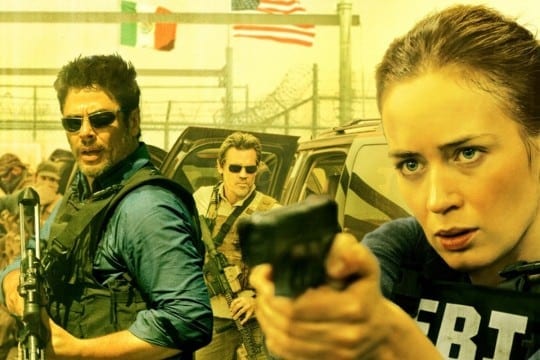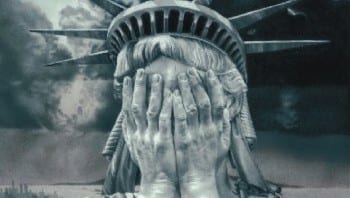Sicario: A Zero Dark Thirty for the “war on drugs”?
![]()
//
More glossy thriller manure from Hollywood, passing as a serious “meditation”—or even “art”. The sewer, self-justifying, narcissist capitalist culture of the “better offs” never stops.
By Joanne Laurier, wsws.org
Directed by Denis Villeneuve; screenplay by Taylor Sheridan

Villenuve: “Made it, ma, top of the world!” His French roots did not save this man from being consumed by Hollywood chicanery and the prevailing propagandistic superficiality.
French-Canadian filmmaker Denis Villeneuve’s new movie Sicario is a crime thriller dealing with the top-secret efforts of American intelligence forces to take down a powerful Mexican drug cartel. Villeneuve has directed a number of feature films—the best known are Incendies (2010), about the consequences of conflicts in the Middle East, and Prisoners (2013), set in Pennsylvania, which concerns a father who takes desperate, violent measures when his daughter goes missing.
The visceral Sicario, whose title means “hitman” in Mexican slang, is a confused and shallow work that asks whether illegal, brutal CIA and FBI operations in the so-called “war on drugs” are justified, and answers—reluctantly or otherwise—in the affirmative.
The film opens during a raid on a group of kidnappers in Arizona. In the course of the raid, FBI agent Kate Macer (Emily Blunt) and her SWAT team discover dozens of mutilated corpses in the walls of a house. An IED then explodes, killing several agents. Even in the face of such dastardly crimes, Kate aspires to play by the rules. She is subsequently recommended by her boss Dave Jennings (Victor Garber) to a flippant, cynical Matt Graver (Josh Brolin) for what turns out to be a CIA operation against a drug cartel boss.
Assuming that Matt’s team will be working on US territory, Kate is startled to discover the multi-agency team’s private jet will land in El Paso, Texas, on the Mexican border. Graver hints at activities on the other side of the frontier.
Her misgivings increase on board the plane when she meets Graver’s partner, the mysterious, opaque Alejandro Gillick (Benicio del Toro), described as a Department of Defense consultant. Alejandro’s apparent nightmares and his dead-eyed look alert the spectator to the fact that he is up to something out of the ordinary. Graver explains to Kate that the objective of the mission is to “dramatically overreact” in order “to stir the pot.”
Once they reach the border, the conspicuous black SUVs carrying the American agents are escorted by Mexican police in vehicles outfitted with machine guns. The convoy tears through Juárez, painted as a hellhole where decapitated bodies swing from bridges and crime is all-pervasive. After the target, drug boss Guillermo Diaz (Edgar Arreloa) has been handed over by Mexican law enforcement to the Americans and the FBI-CIA convoy is on its way back to the US; Matt, Alejandro and other team members, including a reluctant Kate, become involved in a shootout with several carloads of men trying to rescue Diaz.
From there, the convoluted plot involves the American agents torturing Diaz and locating a tunnel under the US-Mexico border used for mass drug transportation. But the nocturnal tunnel assault is actually a CIA diversion facilitating Alejandro’s entry into Mexico, where he executes a murderous, but effective, plan. (We have been led to believe, incidentally, that the drug lord of drug lords, Fausto Alarcón [Julio Cedillo], “is a ghost” who no one can locate. In fact, the secret task force finds him with almost ridiculous ease.)
At every step of the mission, the anxiety-ridden, chain-smoking Kate, the supposed moral center of the film, is tormented by the illegal nature of the clandestine actions performed by Matt’s operatives. “You will not survive here. You are not a wolf. This is the land of wolves now,” intones Alejandro—a highly valued sicario.
A number of talented performers are at work in Villeneuve’s Sicario, including Blunt, Brolin, del Toro and Daniel Kaluuya as Kate’s FBI partner. Brolin is a particularly gifted actor, whose appealing presence, despite the hints in his character of a sinister core, is misused in this film. The work of renowned cinematographer Roger Deakins is also on display here. However, the numerous striking aerial shots, of both desert wasteland and urban centers, seem to be rather pointless. The connection between these images and the sordid goings-on on the ground is not clear.
Villeneuve is not without talent. In this film he may seem to be, and he evidently very much wants to be seen, as exploring complex political, moral and emotional issues in a way that goes beyond the average Hollywood fare. Indeed Sicario at first glance has a certain disturbing, intriguing quality, which has found an almost unanimously positive response from critics.
However, beneath the picturesque, “complicated” surface of Sicario there are a number of genuinely unhealthy ideas and themes at work.
To begin with, the manner in which Sicario’s creators construct their drama ought to set off alarm bells. It is highly manipulative and shabby.
The film’s opening sequence sets the tone. Well-meaning, clean-cut US law enforcement agents come face to face with “pure evil,” the gruesome remains of the victims of some monstrous criminal operation. It is a bloody scene—body parts fly through air after the IED goes off—meant to impress the spectator with the depth of the horror that the American state confronts. It is intended as a sort of mini-9/11. “Everything changes” for Blunt’s character. She is ready to pursue evildoers to the ends of the earth.
The depiction of Juárez as a hellhole, with dead bodies swaying in the wind, and the story of Alejandro’s wife and daughter, who died terrible deaths at the hands of the drug kingpin, add further fuel to the fires of moral outrage. Then there is the portrayal of the Juárez gang members who attempt the rescue of Diaz as a species of subhumans, especially one heavily tattooed individual who resembles some alien life-form …
Rooting a film, as this one so largely is, at least in terms of its most emotive elements, in personal revenge is one of the cheapest, laziest and most retrograde approaches possible. Whatever the conscious intentions of the screenwriter, Taylor Sheridan, and director, in the end, they make use of the savagery of the drug cartel to justify the vigilante-criminality of the CIA-FBI mission (assassinations, torture and abuse of prisoners, illegal arrest and detention of a Mexican citizen, “invasion” of Mexican territory, etc.). The film’s ominous, brain-hammering score by Jóhann Jóhannsson drives home the point that the American characters and the audience are entering a lawless, cutthroat world.
In other words, Sicario’s not-so-subtle subtext is: Yes, the Americans may be “crossing the line,” even doing some terrible things, but the enemy is far worse!
As is the case with many of the films about the “war on terror,” the entire framework in place here is false. America is not “besieged,” either by terrorists or drug lords, America is not perhaps “overreacting” to a war being conducted against it. Imperialism is ultimately responsible for the conditions breeding both terrorism and the drug trade.
As the WSWS has explained, the ultimate aim of the “drug war” is not to stop narcotics coming into the US, a multibillion-dollar enterprise that makes vast profits for US banks and which has been used as a funding source for American covert operations internationally for decades. Its purpose is rather to preserve US domination by military means at the expense of the workers of the entire hemisphere.
Needless to say, this is not how Villeneuve and company, including the US punditry, see things. The filmmakers in their production notes assert that the movie “exposes a world of hard questions and even harder answers… where there is no clarity and the only inviolable law is the law of staying alive to fight another day.” But what are these “hard answers”? The film suggests that although CIA “wolves” function as hitmen, they nonetheless perform a necessary and invaluable service, and must be allowed to “fight another day.”
The comparison of Sicario to various films about the so-called war on terror is not something we have dreamed up. Dozens of critics and commentators have made a generally approving connection between Villeneuve’s work and Kathryn Bigelow’s pro-torture, pro-CIA Zero Dark Thirty (2012).
The language Bigelow used to defend her indefensible film would not be out of place in Sicario ’s production notes. Osama bin Laden, she wrote in early 2013, “was defeated by ordinary Americans who fought bravely even as they sometimes crossed moral lines, who labored greatly and intently, who gave all of themselves in both victory and defeat, in life and in death, for the defense of this nation.”
The implied case in Sicario for “anti-drug” or “human rights” intervention in uncivilized Mexico, seemingly under the control of despot-druglords (stand-ins for Milosevic, Hussein, Assad, et al), goes hand in hand, inevitably, with a disdainful or condescending attitude toward the Mexican people. The one strand of the story that purports to deal with “ordinary” Mexicans concerns the family of a corrupt cop. The scenes of his home life, complete with a sullen wife and a loving father-son relationship, are perfunctory and unconvincing.
Villeneuve let the unpleasant cat out of the bag, frankly, when he told an interviewer from Grantland that a “left-oriented” American friend had recently commented favorably to him about Donald Trump. The director went on to note that Trump was something of a straight shooter and “that is really refreshing for everyone. It really creates a shock in our country because he doesn’t try to please people. He just expresses what he thinks. And that is a very strong thing.”
Let us remind the reader what the “refreshing” Trump said about Mexican immigrants this summer. “When Mexico sends its people, they’re not sending the best,” Trump said July 16. “They’re sending people that have lots of problems and they’re bringing those problems. They’re bringing drugs, they’re bringing crime. They’re rapists and some, I assume, are good people, but I speak to border guards and they’re telling us what we’re getting.”
Villeneuve explains in the interview that he is not in agreement with Trump. But Sicario reveals that the outlook expressed by the reactionary Republican xenophobe is seeping into the thinking and feeling of layers of the affluent middle class, overwhelmed by phenomena like the drug trade, “terrorism” and other global crises. They are propelled by the logic of their social position, and their blindness to complex historical and social realities, toward the forces of “law and order.”
Note to Commenters
Due to severe hacking attacks in the recent past that brought our site down for up to 11 days with considerable loss of circulation, we exercise extreme caution in the comments we publish, as the comment box has been one of the main arteries to inject malicious code. Because of that comments may not appear immediately, but rest assured that if you are a legitimate commenter your opinion will be published within 24 hours. If your comment fails to appear, and you wish to reach us directly, send us a mail at: editor@greanvillepost.com
We apologize for this inconvenience.
![]() Nauseated by the
Nauseated by the
vile corporate media?
Had enough of their lies, escapism,
omissions and relentless manipulation?
Send a donation to
The Greanville Post–or
But be sure to support YOUR media.
If you don’t, who will?



